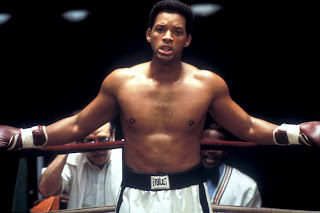Having seen documentary footage of the real Ali, it is easy to spot where the film departs from reality. Characters are moved around and lines are modified.The creative liberties the filmmakers took with the film may deviate from the reality, but they allow the film to better illustrate to the audience exactly who Ali was.The use of fictional footage, while less real than actual footage, is much more personal.Emphasis on the dramatic, impossible camera angles, the film brings the audience into the heart of the action. This allows the film to explore the less public side of it's characters. Rather than the bombastic, charismatic Ali we are presented with in When We Were Kings, we see a more reserved version. His flaws and vices, hidden from the world, are exposed to the camera, as we peek into his personal life of infidelity.
Ali's relationship with Malcolm X, and the civil rights movements as a whole, is a very important aspect of Ali's story that is able to be explored within the format of the film. Intimate phone calls between Ali, Malcolm, and the nation are depicted, the assassination of Malcolm, and it's effect on Ali is able to be brutally depicted. Tension within the nation of Islam are exposed, as we see the interactions between the faction and Ali and Malcolm. Important scenes, including one where Ali remarks "I never stopped being a Muslim" and "I love the nation, but it does not own me"provide important insight into the organization of the civil rights movement. A complex, multi-faceted issue, Ali stands out from the Nation of Islam, both for his behavior, and his approach towards the faith. Where the Nation is dogmatic, impersonal, and unforgiving, Ali is flexible, passionate, and capable of giving second chances. Although they all share the same goal, their approach is very different.
The civil rights movement is as much a part of Ali's history as Ali is a part of it's history. The two are intertwined. How else could someone have risen as high as Ali, without the anger of 400 years of imprisonment and enslavement. How else could they have challenged the federal government, in wartime? Similarly, the civil rights movement undoubtedly benefited from the influence of young and passionate heroes like Ali, who were not afraid to stand against the tide for what they believed. In the first 10 minutes of the film, the audience is introduced to the frustration of community, where we see Ali tailed by the cops during his late night training session. We see a younger Ali attend a speech being given by Malcolm X, a first encounter captured before the significance of both of these characters is fully revealed. The scope of the film only really encompasses the later stage of the relationship between these two, but the use of montage allows the audience to get a basic understanding of the relationship between these tow characters.
Ultimately however, the key focus of the film is that of identity. The level of importance Ali places on his name being correctly used reflects the attitude of an individual, and a culture that has been oppressed and mistreated for too long. The importance of correctly identifying Ali stems from the fact that in this era of conflict and hope, every success and every triumph is important. From Ali's father getting indignant about his son's name change, to the "x's z's and y's" of the nation's members, the film explores Ali's story in a time of cultural crisis, and a demand for recognition, of a people's true identity.





Kevin,
ReplyDeleteExcellent social analysis of the film's role in crafting the historical and political vision of Ali outside the ring. I think that's one of the film's main goals, and you do a nice job of weaving together sources with the film content to make the case. Nice work!